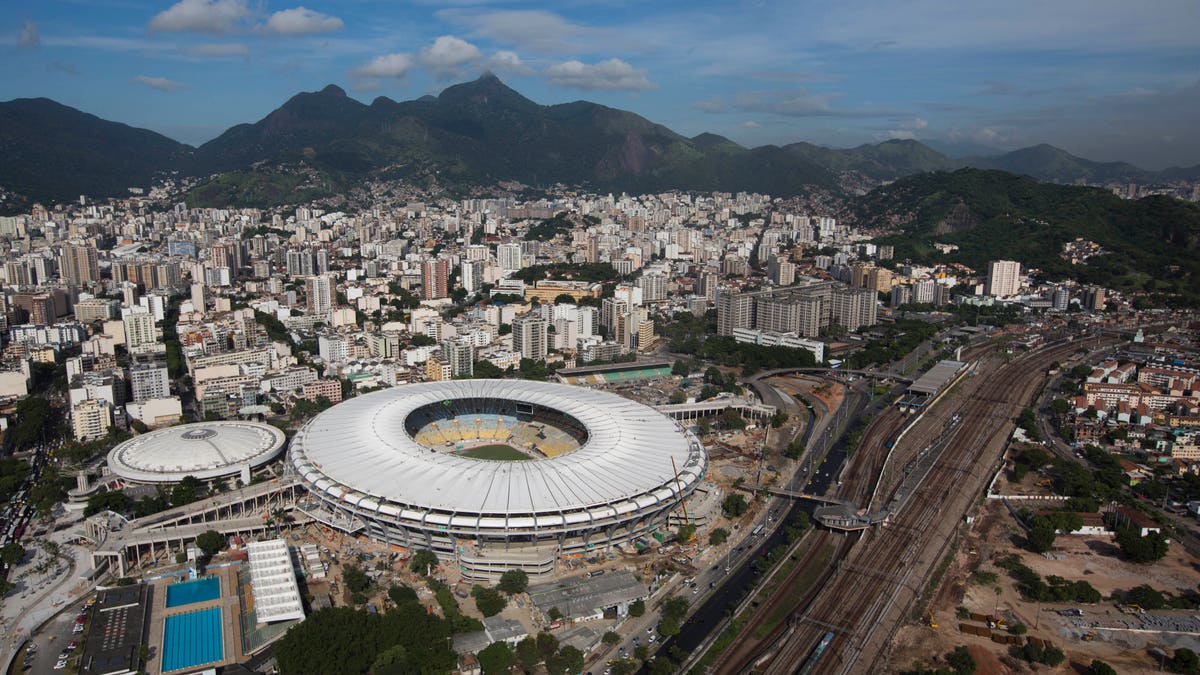
FILE - In this April 11, 2013 file photo, an aerial view shows the new rooftop of the Maracana Stadium, which is undergoing renovations in preparation for the 2013 Confederations Cup and 2014 World Cup, in Rio de Janeiro, Brazil. After almost three years of renovations, the Maracana Stadium is finally set to reopen in Brazil. The inauguration on Saturday, April 27, 2013 comes after a series of delays and amid widespread criticism related to overspending and the venue's privatization. (AP Photo/Felipe Dana, File) (The Associated Press)
SAO PAULO – After a series of delays, criticisms and protests, the iconic Maracana stadium is finally ready to reopen in Rio de Janeiro.
The venue for the 2014 World Cup final and of the opening and closing ceremonies of the 2016 Olympics will host a game between teams put together by former soccer stars Ronaldo and Bebeto on Saturday — although with a limited audience — in a test event ahead of the Confederations Cup in June.
It will be the first game at the stadium since it was closed for the renovation nearly three years ago.
The "Temple of Football," as it's often called, will reopen as one of the most modern sporting venues in Brazil, but the improvements came amid widespread criticism related to allegations of overspending, protests against the stadium's privatization plans and construction delays.
The delays are part of the reason that the inauguration match will be a makeshift friendly between former teammates of Ronaldo and Bebeto, with only construction workers and guests allowed to watch it on site.
Maracana was initially expected to be completed last December, but the need to change the venue's roof entirely forced the deadline to be extended into 2013. The local 2014 World Cup organizing committee then set an April 15 deadline for all Confederations Cup stadiums, so they could host at least three test events, but the Maracana missed that, too.
FIFA later said it would accept two test events in each venue, but the only full-scale game planned at the Maracana will be the Brazil-England friendly on June 2. Maracana will host three Confederations Cup matches, including the final on June 30.
The cost to renovate the venue — nearly $500 million — also has attracted criticism, especially after the stadium had already gone through a significant face-lift before the 2007 Pan American Games. It had also been upgraded before FIFA's inaugural Club World Cup in 2000. There were talks that more changes would be needed before the 2016 Olympics, but the local government has already dismissed closing the venue again for that.
What has attracted the most complaints is the privatization plan for the Maracana, which will give the government much less money than it invested in the stadium and will lead to the demolitions of an indigenous museum, a public school and some athletics facilities in the area.
Government officials have said the museum isn't used anymore and that all the buildings need to be removed to guarantee the stadium's modernization.
Critics say the government is basically giving away the venue so businessmen can transform the area into a lucrative commercial center to attract the city's rich and keep away the poor.
"Saturday will mark the first time that we will see this new Maracana which will be available only to a small group of people," said Gustavo Mehl, a researcher with the Rio de Janeiro federal university and a member of the Comite Popular Rio group, which has been protesting against the changes at the stadium.
"We criticize this project not only because of the costs, but also because it takes away the social and popular aspects that existed at the Maracana before the renovation began," Mehl said.
Several protests are expected outside the Maracana before Saturday's match, which is expected to be attended by Brazilian President Dilma Rousseff and Sports Minister Aldo Rebelo, the government official in charge of the country's preparations for the World Cup and the Olympics.
The new Maracana will have a capacity of nearly 80,000 people but only about 30,000 are expected on Saturday, including guests invited by local organizers.
One of the most recognizable stadiums in the world — and once the largest — the Maracana is to South American football what Yankee Stadium is to baseball, what Lambeau Field is to American football, and what Madison Square Garden is to basketball.
It's where Pele scored his 1,000th career goal in 1969, and where nearly 200,000 people watched the 1950 World Cup final, when Brazil was upset by Uruguay in what became known as the Maracanazo. It was the largest crowd ever known to have watched a football match.
Rio de Janeiro has been without a top venue since the Joao Havelange Stadium — home to the athletics competitions in the 2016 Rio Olympics — was closed in March because of a faulty roof.
___
Follow Tales Azzoni at http://twitter.com/tazzoni
